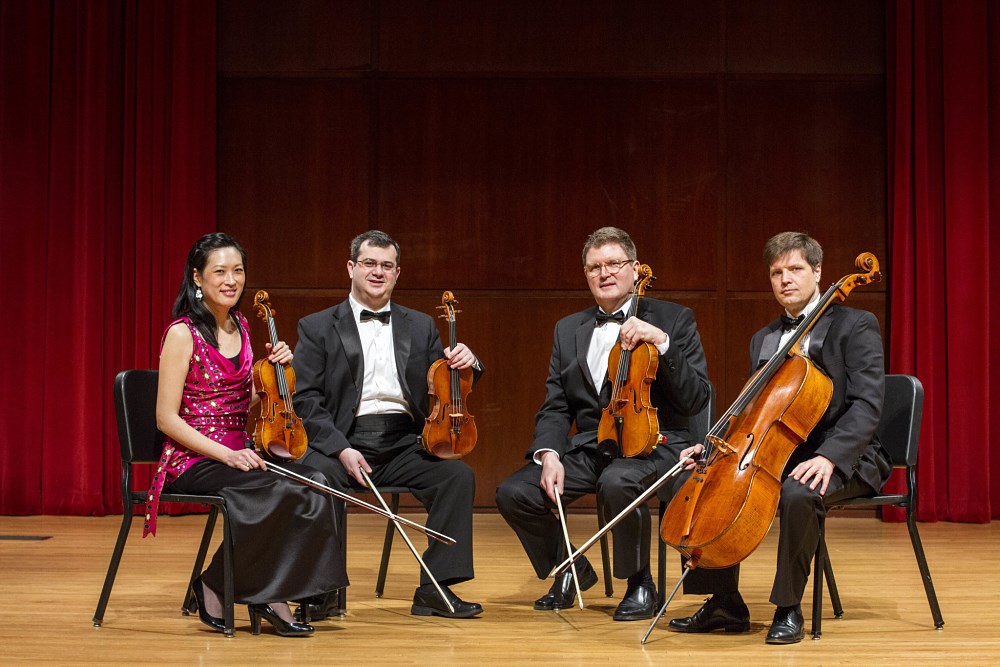The Power of Papa Haydn
Philomusica Quartet does works by Beethoven, Pleyel, Fanny Mendelssohn, all influenced by Haydn.
Now in-residence at Wisconsin Lutheran College, the The Philomusica Quartet (violinists Jeanyi Kim and Alexander Mandl, violist Nathan Hackett and cellist Adrien Zitoun) returns to the Wisconsin Conservatory of Music for a concert Monday night.
Music historian Howard Goodall describes the late classical and early romantic periods (1750-1850) as the Age of Elegance. This is certainly true of the works by Ignace Pleyel, Fanny Mendelssohn and Ludwig van Beethoven selected for this program. Although absent from the program, the spirit of Joseph Haydn is clearly felt in this music.
Even though Pleyel composed 57 string quartets, Philomusica Quartet members had not heard of them. When they were recommended by friends who had published one of few recordings of his works, quartet members were delighted. Mandl describes the programmed work, Pleyel’s String Quartet in E flat major, Op. 2 No. 4 as offering a “high degree of elegance. Pleyel wrote in the Italianate style – an architectural style with great finesse.” He envisions “parallel lines between pillars, never abrupt or jolting.”
Perhaps Pleyel’s popularity in his time resulted from the accessibility of his writing, which yielded impressive results, even for the advanced amateurs among the leisure class. “The music is very easy for string instruments,” Mandl observes. The choice makes for pleasant listening as well.
Fanny Mendelssohn wrote more than 460 works. Why to we know so little about them? She wrote pieces primarily to be played at home. Options for a female composer were constrained by social attitudes of the day – including those of Fannie herself. Her Wikipedia profile quotes some illuminating letters. Her father: “Music will perhaps become his [i.e. Felix’s] profession, while for you it can and must be only an ornament.” Her brother Felix: ” From my knowledge of Fanny I should say that she has neither inclination nor vocation for authorship. She is too much all that a woman ought to be for this.” Her own thoughts: “I have been composing a good deal lately…They will form a delightful souvenir, a kind of second diary. But do not imagine that I give these names when playing them in society, they are for home use entirely.”
Fannie Mendelssohn’s wrote her only string quartet, Quartet No. 1 in E flat major, with more serious intent. “It’s not just a curiosity,” Mandl maintains. “It is better than a lot of male counterparts.” Felix consulted with Fanny on many of his compositions, and this quartet reminds Mandl of early work by Felix. But “she has her own stamp – a different harmonic language, owing more to Beethoven.”
The Philomusica will close the concert with an early Beethoven quartet, String Quartet in G major, Op. 18 No. 2. The quartet has been called the “compliments” quartet because the opening recalls the courtly music of an 18th century salon. The work owes much to Haydn. Beethoven was also his student for a time. Critic Melvin Berger suggests that “seemingly the least ambitious quartet (of the Opus 18 set of six quartets), it emerges as a charming and witty work.”
The Philomusica Quartet has put together a well matched package – a night of elegant music sampling the spirit of the early 19th century.
East Side residents who did not follow the Philomusica to their new West Side location at Wisconsin Lutheran College have an opportunity to recall what they have been missing.
(Note a student rate and a 20 percent discount for those purchasing tickets for the two Wisconsin Conservatory concerts.)
Complimentary parking for evening concerts is available at Milwaukee Eye Care, 1684 N. Prospect Ave., located one block north of the Conservatory.
The Quartet returns to the Wisconsin Conservatory on May 20, 2018 with works by Rachmaninoff, Schulhoff, Dvorak, and Borodin’s beloved String Quartet No. 2 in D Major.
Preview
-
A Sacred Choir, 70 Voices Strong
 Dec 14th, 2025 by Martha Brown
Dec 14th, 2025 by Martha Brown
-
Prometheus Trio Goes Bohemian
 Dec 3rd, 2025 by Martha Brown
Dec 3rd, 2025 by Martha Brown
-
Present Music Offers New Choral Works
 Nov 20th, 2025 by Michael Barndt
Nov 20th, 2025 by Michael Barndt


















